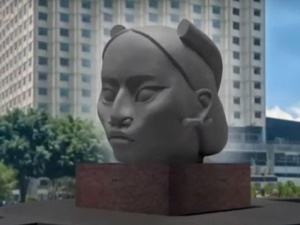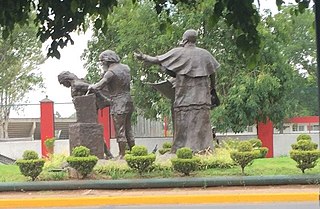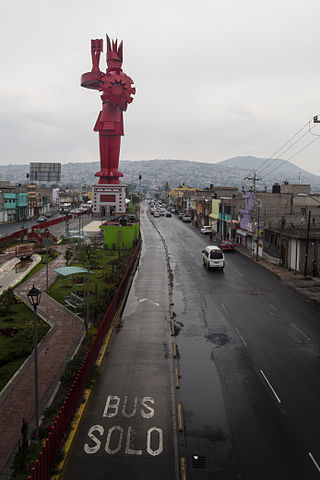
The Monument to Woody Allen (Spanish : Monumento a Woody Allen) is a life-size bronze sculpture of the American actor, writer and director Woody Allen, situated in the Spanish city of Oviedo.

The Monument to Woody Allen (Spanish : Monumento a Woody Allen) is a life-size bronze sculpture of the American actor, writer and director Woody Allen, situated in the Spanish city of Oviedo.
The statue was designed by Vicente Santarúa and installed in 2003 by mayor Gabino de Lorenzo. El País remarked that "It looks like he is walking with a sad face and his mind somewhere else, not in Oviedo right now, although if you put yourself to his side and start a conversation with him it is so realistic that it looks as if he would answer you". Allen had travelled to the city in 2002 to accept a Prince of Asturias Award. [1] His 2008 film Vicky Cristina Barcelona was partially set there. [2]
In front of the statue there is a plaque with Allen's description of Oviedo, reading in Spanish "Oviedo is a delicious city, exotic, beautiful, clean, pleasant, calm and pedestrianised, like it does not belong to this world, as if it didn't exist... Oviedo is like a fairy tale". [3]
Oviedo has been noted for its statues, with the city containing over a hundred outdoor sculptures. [4] [5] [6] [7]
In its first year on public display, the statue was vandalised twice, including the glasses being broken in December 2003. [8] The city council said in 2008 that regular occurrences of vandalism meant that the glasses would only be repaired once a year. [9] Returning to the city in December 2005, Allen joked that he would speak to the mayor about the vandalism. [10]
In January 2018, the Asturias Feminist Organisation called for the statue to be removed, owing to the allegations of sexual abuse against its subject. [2] In his 2020 autobiography Apropos of Nothing , Allen remarked that a "hate-driven mob" might pull down the statue. [11]

Letizia Ortiz Rocasolano is Queen of Spain as the wife of King Felipe VI.

Ramón Melendi Espina, known as Melendi, is a Spanish singer-songwriter. His specialties are rock, flamenco, and rumba styles.

The Oscar Niemeyer International Cultural Centre (Spanish: Centro Cultural Internacional Oscar Niemeyer, is a cultural centre located in the city of Avilés, in Spain. It takes its name from its architect and designer, Brazilian Oscar Niemeyer.
Pablo Serrano Aguilar, was a Spanish abstract sculptor.
Lucinda Urrusti was a Spanish-born Mexican artist, whose work has gained fame not only from the writing of art critics, but also by poets and writers from other fields, such as Carlos Fuentes. She was born in Melilla to a Spanish family which came to Mexico in 1939 to escape the Spanish Civil War and remained in Mexico since. Urrustia was a part of Mexico’s Generación de la Ruptura, a group of artists that broke with the dominant Mexican muralism of the first half of the 20th century with most of her work classed as Impressionism and/or abstract. However, she was also a noted portrait artist, having depicted a number of Mexico’s elite in the arts and sciences.
Miquel Navarro is a Spanish sculptor, painter and contemporary poet.

Podemos Asturias is the regional branch of Podemos in Asturias, Spain.

María Dolores Medio Estrada was a Spanish writer, the winner of the Premio Nadal in 1952 for her work Nosotros, los Rivero. She is often included in the literary Generation of '36.

The Monument to Christopher Columbus is a statue by French sculptor Charles Cordier first dedicated in 1877. It was originally located on a major traffic roundabout along Mexico City's Paseo de la Reforma, and was removed on 10 October 2020 in advance of protests.
The COVID-19 pandemic in Asturias was part of the Spanish outbreak of the worldwide COVID-19 pandemic.

Covo Island, better known as the Island of Sculptures or Illa das Esculturas in Galician, is a park and island located near the mouth of the Lérez River, in Pontevedra, Spain. It has an area of 70,000 m2 (750,000 sq ft) where twelve granite sculptures by international artists are displayed. It is the largest and most important open-air permanent exhibition in Galicia, and one of the most important in Spain.

Valle-Inclán, is a sculpture created by the Spanish sculptor César Lombera, located in Pontevedra (Spain). It is located in Plaza Méndez Núñez and was inaugurated on 26 June 2003.

Tlalli was a proposed sculpture of a large indigenous woman's head by contemporary artist Pedro Reyes. It was proposed to replace the Monument to Christopher Columbus along Mexico City's Paseo de la Reforma.

The Monumento Encuentro refers to two bronze statues seated on a bench in Colonia Tabacalera, Cuauhtémoc, Mexico City, designed by Óscar Ponzanelli in 2017. Otherwise known as the bench of Fidel Castro and Che Guevara and the statues of Fidel Castro and Che Guevara, the artwork features sitting statues of Fidel Castro and Che Guevara, major figures of the Cuban Revolution (1953–1959). The monument references the first time both met in 1955 in Tabacalera.

On the afternoon of 25 September 2021, a group of anonymous feminists intervened in the Christopher Columbus roundabout on Paseo de la Reforma Avenue, Mexico City. On an empty plinth surrounded by protective fences, they installed a wooden antimonumenta, a guerrilla sculpture that calls for justice for the recurrent acts of violence against women in Mexico. It was originally called Antimonumenta Vivas Nos Queremos, subsequently known as Justicia, and depicts a purple woman holding her left arm raised and the word justice carved into a support on the back. Additionally, the Columbus roundabout was also symbolically renamed the Glorieta de las mujeres que luchan.

The Young Woman of Amajac is a pre-Hispanic sculpture depicting an indigenous woman. It was discovered by farmers in January 2021 in the Huasteca region, in eastern Mexico.

The Monumento a los Constructores, also known as the Monumento a los Constructores de la Ciudad, is a partly-destroyed outdoor bronze monument installed along Acueducto Avenue, in the historic center of Morelia, Michoacán, Mexico. The artwork was created by José Luis Padilla Retana and was unveiled in May 1995 in honor of those who built the city.

Guerrero Chimalli is an outdoor steel sculpture by Enrique "Sebastián" Carbajal, installed along Bordo de Xochiaca Avenue, in Chimalhuacán, State of Mexico. It is a 60 meters (200 ft) artwork that depicts an indigenous warrior holding a Chīmalli and a mace. The plinth serves as a museum and the sculpture as an observation deck. Excluding their plinths, it is slightly taller than the Statue of Liberty, in the United States.

The Hand is a bronze sculpture by the Colombian sculptor Fernando Botero. Since 1994, it has been on public display in Madrid, Spain. The 500 kilogram hand is of a plump form, a trademark of the sculptor.